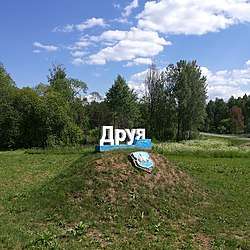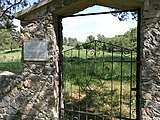Druya
Druya (Belarusian: Друя; Russian: Друя; Polish: Druja) is a historic townlet in Vitebsk Region, Belarus, about 30 km northeast of Braslaw. It is located on the left bank of the Daugava River, at the mouth of the Druyka River, opposite the Latvian parish of Piedruja. The population is about 1,500 (2006). Druja is best known for the Druja Trinity Catholic church, built in 1646. The church was previously part of a Bernardine monastery.
Druja Друя | |
|---|---|
 Welcome sign on the western side of Druya | |
 Coat of arms | |
| Country | |
| Region | Vitebsk Region |
| District | Braslaw District |
| Population (2006) | |
| • Total | 1,500 |
| Time zone | UTC+2 (EET) |
| • Summer (DST) | UTC+3 (EEST) |
History
Medieval Druja was a stronghold of the Massalski princely family fought over by the Grand Duchies of Lithuania and Muscovy through much of the 16th and 17th centuries. Maciej Stryjkowski mentions it in his chronicle when describing the events of 1386. Ownership passed to the Sapieha family in the 17th century. The fortified suburb of Sapieżyn was founded by Jan Stanisław Sapieha in 1618.
Druja's oldest building is a Baroque church in the part of town known as Sapiezhyn. It was built in the 1640s and later expanded. The illuminated Druja Gospels date from 1580.
Jewish community
Druja was formerly known for its thriving Jewish community, around 2,200 Jews lived in Druya on the eve of World War II (half of the whole local population). The parents of writer Saul Bellow hailed from Druja.
Most of the town's Jewish population was killed during the Holocaust by Nazi German forces in 1942. The German troops had occupied Druja by early July 1941; a ghetto was created in April–May 1942. On June 17, 1942, the Germans and the local police surrounded the ghetto. A fire broke out and burned the ghetto and the nearby orthodox church. The Jews from the ghetto were gathered near the Druyka River and shot into a large grave. More than 1,000 Jews were killed in Druya.[1]
Gallery
 Entrance gate to the old Jewish cemetery in Druya
Entrance gate to the old Jewish cemetery in Druya Gravestones in the Jewish cemetery of Druya
Gravestones in the Jewish cemetery of Druya_1964_Anatoly_Nalivaev.jpg) Synagoge of Druya (1964), by Anatoly Nalivaev
Synagoge of Druya (1964), by Anatoly Nalivaev.jpg) View of Druya, by Napoleon Orda
View of Druya, by Napoleon Orda.jpg) Divine service in the Sapiezhyn church
Divine service in the Sapiezhyn church.jpg) A Boris stone retrieved from the Drujka River has become a local tourist attraction.
A Boris stone retrieved from the Drujka River has become a local tourist attraction.